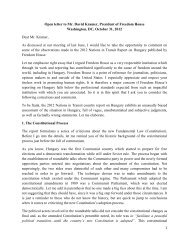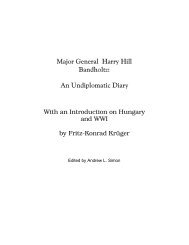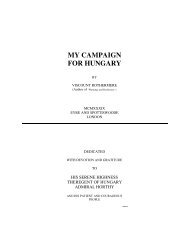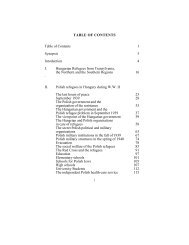The Fate of Western Hungary 1918-1921 - Corvinus Library ...
The Fate of Western Hungary 1918-1921 - Corvinus Library ...
The Fate of Western Hungary 1918-1921 - Corvinus Library ...
You also want an ePaper? Increase the reach of your titles
YUMPU automatically turns print PDFs into web optimized ePapers that Google loves.
Chapter 5: Austrian efforts and the failure <strong>of</strong> territorial transfer<br />
June 1920 – August <strong>1921</strong><br />
<strong>The</strong> obligatory signing <strong>of</strong> the Trianon peace decree – as already noted – took<br />
place on June 4, 1920 in Paris. <strong>The</strong> decision – in harmony with the Austrian<br />
treaty <strong>of</strong> Saint-Germain signed on September 10, 1919 – cut <strong>of</strong>f 4,364 km 2 <strong>of</strong><br />
western Hungarian territory. <strong>The</strong> last census, in 1910, enumerated a population<br />
<strong>of</strong> 345,082, <strong>of</strong> which 245,714 were <strong>of</strong> German mother-tongue, 49,374 <strong>of</strong><br />
Croatian and 44,191 <strong>of</strong> Hungarian. Of the total population, including the ethnic<br />
Hungarians, 80,632 (23.4%) spoke Hungarian. 213 It is important to point out<br />
once again that, the majority <strong>of</strong> the population given to Austria were <strong>of</strong> German<br />
extraction and mother-tongue and not <strong>of</strong> Austrian extraction and mothertongue,<br />
as the latter did not yet exist! [In fact, the majority <strong>of</strong> the German<br />
speaking population traced their ancestry not to what was to become Austria<br />
but to other German provinces or states-ed.]<br />
Hungarian public opinion could not come to grips with and accept the<br />
obviously unjust and cynical decision that gave Austria, an equally defeated<br />
country in the war, territory from its also defeated ally, <strong>Hungary</strong>. “It is doubly<br />
painful – wrote Foreign Minister Miklós Bánffy (1873–1950) in his memoirs –<br />
that we had to hand over Sopron and its surrounding area not to one <strong>of</strong> the<br />
victorious countries but to Austria. <strong>The</strong>re was something terribly humiliating in<br />
it, and hellishly ironic. Hungarians fought for centuries to protect their country<br />
against Austria. And now that the Entente breaks up the Austrian empire, they<br />
wish us to hand over lands, to what remains <strong>of</strong> Austria, that have always been<br />
ours; wishes it at a time when Austria is as much a defeated country as we are.<br />
What is more, our affiliation with Austria is what drew us into the war, into a<br />
war that nobody in <strong>Hungary</strong> wanted. A war started over the assassination <strong>of</strong> an<br />
Austrian archduke.” 214<br />
Due to the ongoing humbling <strong>of</strong> <strong>Hungary</strong>, some nationalist radical circles<br />
began to organize. It is a unspoken fact that, beginning in early 1920, large<br />
amounts <strong>of</strong> arms and ammunition were shipped from Austria to <strong>Hungary</strong> for the<br />
Hungarian National Army. It was partly <strong>of</strong>ficial, partly as smuggled supplies<br />
but <strong>of</strong> which the Viennese Ministry <strong>of</strong> War was aware, as were some <strong>of</strong>ficials<br />
<strong>of</strong> the Austrian disarmament committee. <strong>The</strong> country had a burning need for<br />
this materiel since it was totally vulnerable and unprotected at this time.<br />
Romanian forces had only withdrawn from Trans-Danubia between October 4<br />
and November 15, 1919, from Budapest on the latter date, from the areas<br />
between the Danube and Tisza Rivers on November 23, retreating to the left<br />
bank <strong>of</strong> the Tisza River by November 23, which they vacated only on March<br />
213 Lőkkös, 143, op. cit., pp. 288–289, 292.<br />
214 Major, Zoltán: Bánffy Miklós: Huszonöt év (1945) [Miklós Bánffy: Twenty-five<br />
years (1945)]. Budapest, 1993, pp. 65-66. Bánffy was Foreign Minister during this most<br />
active period (April 14, <strong>1921</strong> – December 29, 1922). <strong>The</strong> pinnacle <strong>of</strong> his ministerial<br />
career was as a participant at the Venice talks (October 11-13, <strong>1921</strong>).<br />
90
















